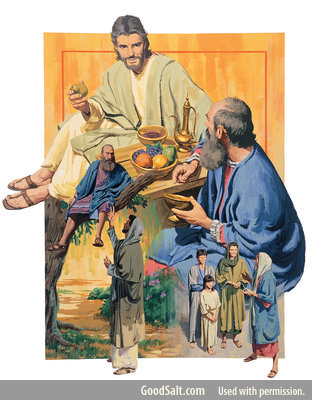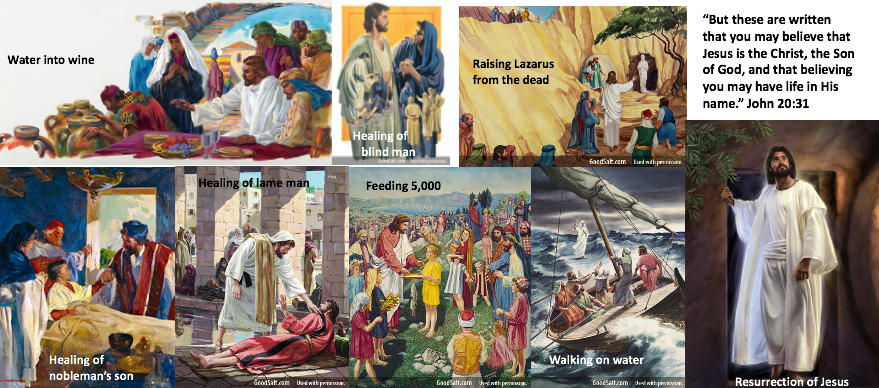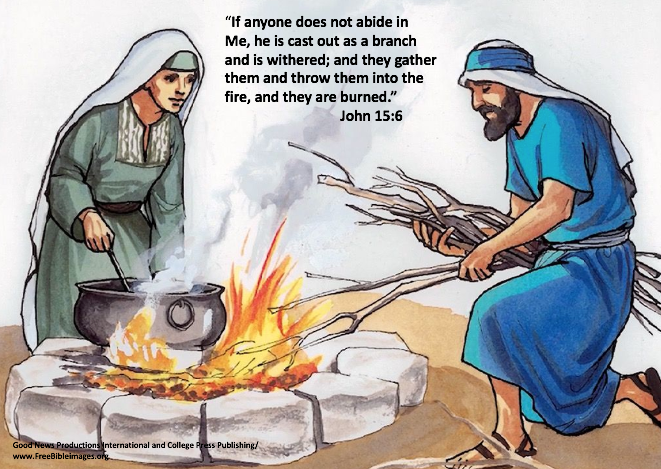“He who overcomes shall be clothed in white garments, and I will not blot out his name from the Book of Life; but I will confess his name before My Father and before His angels.” Revelation 3:5
Jesus now addresses the fifth church in Asia Minor. “And to the angel of the church in Sardis write, ‘These things says He who has the seven Spirits of God and the seven stars: “I know your works, that you have a name that you are alive, but you are dead.” ‘ (Revelation 3:1). “Sardis was located a little over thirty miles southeast of Thyatira and was a glorious city in the past. In the sixth century BC it was considered one of the greatest cities on earth and was ruled by the wealthy King Croesus (called Midas by the Greeks because of his golden treasures). But by the time John wrote to the church there in the first century AD, the city’s greatness lay in the distant past. Unfortunately, the church at Sardis had the same problem—a great past but dismal conditions in the present. So, the Lord gives this church the steps they need to come alive again as well as a warning if they fail to do so.” 1
When the ascended Lord Jesus refers to Himself as “He who has the seven Spirits of God,” He is telling this church that He knows their true spiritual condition because He possesses the all-knowing Spirit of God(cf. Revelation 1:4b-5a). 2 Nothing escapes the notice of our Lord. Christ also “has the seven stars” or seven angels of the seven churches (cf. 1:20) to remind them of His Lordship over the entire church.
Although they had a good reputation among other churches for being “alive,” the Lord Jesus knew their true condition. This was the kind of church about which people today might say, “They have great music, great preaching, great outreach, a great children’s ministry, and beautiful buildings.” But because Jesus knew their “works,” He could say they were “dead” inwardly without any spiritual life (3:1b). “They were merely playing church.” 3
“Like the Pharisees, their outer appearance was a facade hiding their lack of life (cf. Matt. 23:27-28).” 4
“Dr. Vance Havner has frequently reminded us that spiritual ministries often go through four stages: a man, a movement, a machine, and then a monument. Sardis was at the ‘monument’ stage, but there was still hope!” 5
The remedy for this condition is given by Jesus in the next few verses. “Be watchful, and strengthen the things which remain, that are ready to die, for I have not found your works perfect before God.” (Revelation 3:2). The city of Sardis had fallen into enemy hands more than once, due to the carelessness of sentries who had relied too much on the town’s natural fortifications. 6 The Lord now commanded the church to “be watchful [alert] and strengthen” the areas of weakness in their church “that are ready to die.” The Lord wants His people to be diligent in protecting every element of good that remained in their church. They were not to be careless about this or allow any more of the good that was still in existence to be cast aside as it had been in the past. 7
The Lord Jesus did not find their “works perfect [complete] before God.” The believers in Sardis tended to begin things but never finish them as God desired (cf. Acts 14:26). Do our churches resemble the church at Sardis? Does our outward appearance hide our lack of spiritual life? Did we start out strong for the Lord only to weaken over time and lose the vitality that once was so contagious? Have we held fast to the gospel of grace that transformed our lives, or have we turned away from the “faith alone” gospel to a “faith plus” gospel that promotes reformation instead of transformation?
Jesus then says, “Remember therefore how you have received and heard; hold fast and repent. Therefore if you will not watch, I will come upon you as a thief, and you will not know what hour I will come upon you.” (Revelation 3:3). To overcome their spiritual deadness, these believers needed to “remember” the biblical instruction they “received and heard” from their spiritual leaders. “Sound doctrine is always the foundation of a church that brings honor and glory to God (cf. Titus 2:1-15).” 8
They were also to “hold fast” to this instruction and “repent” and change their attitudes that led to their spiritual deadness. If they did not arise from their spiritual deadness, the Lord would “come upon” them “as a thief,” swiftly and unexpectedly to discipline them for their carelessness and superficial spirituality.
Jesus held out eternal rewards for the faithful “few” in Sardis. “You have a few names even in Sardis who have not defiled their garments; and they shall walk with Me in white, for they are worthy.” (Revelation 3:4). The all-knowing Judge knew of a “few names… in Sardis who” had “not defiled their garments” and “shall walk with” Christ “in white” because they are “worthy” or deserving. This cannot refer to salvation because no one deserves to be saved from hell. The Bible clearly says that salvation is a free gift apart from any works (Romans 6:23b; 4:5; Ephesians 2:8-9; Revelation 21:6; 22:17). Instead, walking with Christ in white is a privilege reserved for the faithful believer who is undefiled in his Christian life.
“He who overcomes shall be clothed in white garments, and I will not blot out his name from the Book of Life; but I will confess his name before My Father and before His angels.” (Revelation 3:5). The risen Lord Jesus promises to the “overcomer” who is “worthy” (3:4) to be honored, the following eternal rewards:
– “Clothed in white garments.” “White garments” are symbolic of one’s works (cf. 19:8) and are pure and free of defilement (cf. 7:9, 13; 19:14; Matthew 22:11-12). “In the ancient world, white robes also connoted festivity and victory.” 9 “Sardis boasted of her trade in woolen goods and dyed stuffs.” 10 Only the believers who remained faithful to Jesus Christ until the end of their lives on earth could enjoy His intimate fellowship in His coming Kingdom (“walk with Me”; cf. 7:14; 22:14). 11
Wilkin provides a helpful insight about this reward. “Keep in mind that the Lord Jesus Himself will be clothed in dazzling white garments that will outshine all others. His glory will be supreme.
“When at the Mount of Transfiguration He appeared in His glory, ‘His clothes became as white as the light’ (Matthew 17:2). Special clothing is not insignificant, because it honors a person. The more glorious the garments, the more honor to the wearer.
“Like the sun, the Lord’s garments will have maximum radiance. The garments of great servants like Moses, Elijah, Daniel, Deborah, Esther, and Mary will surely glow brightly. But theirs will be reflected glory, like the glory of the moon that reflects the glory of the sun.
“Would you not want to be identified as closely as possible with the Lord Jesus and glorify Him, even in your clothing? The quality of your eternal garments will be determined by what you do in this life. Once this life is over, it will be too late to influence your worthiness to walk with Christ in white.” 12
– An honored name that is supremely secure. When Jesus says He will “not blot out his name from the Book of Life,” Armenians teach that Jesus is saying a non-overcoming (unfaithful) believer can lose his salvation. 13 But this would be contrary to Jesus’ teachings in John’s writings elsewhere. For example, Jesus taught, “I am the bread of life. He who comes to Me shall never hunger, and he who believes in Me shall never thirst.” (John 6:35). Christ guarantees that those who come to Him in faith “shall never hunger” or “thirst” for eternal life again because the need He met can never reoccur. The results of believing in Christ are permanent even if we are unfaithful to Christ (cf. 2 Timothy 2:13).
Christ also said, “38 For I have come down from heaven, not to do My own will, but the will of Him who sent Me. 39 This is the will of the Father who sent Me, that of all He has given Me I should lose nothing, but should raise it up at the last day.” (John 6:38-39). Jesus came down from heaven to do His Father’s will which was that all whom the Father had given Him should lose nothing, including their salvation. If Jesus failed to keep believers from losing their salvation, He would have failed to do His Father’s will. And that presents a moral dilemma. For if Jesus failed to do His Father’s will, then He would have sinned and could no longer be God. But Jesus Christ has never lost one believer and He never will because He is God (John 1:1; Titus 2:13) and He always does the will of His Father.
Jesus said, “28 And I give them eternal life, and they shall never perish; neither shall anyone snatch them out of My hand. 29 My Father, who has given them to Me, is greater than all; and no one is able to snatch them out of My Father’s hand.” (John 10:28-29). Christ gives eternal life because it is a gift from Him. We do not earn it. Secondly, He also guarantees that a believer “shall never perish.” Eternal life is God’s life. You can no more perish in hell than God can perish in hell. If a believer in Jesus could lose his salvation, then Jesus just told a lie. Jesus also promises that “neither shall anyone snatch them out of My hand.” Because Jesus securely holds each believer in His hand and no one – not a lion, wolf, thief, bandit, false teacher, popular speaker, demon, devil, not even you yourself – are strong enough to snatch (John 10:12) them out of His hand. The word “snatch” (harpasei) means “to snatch, seize, i.e., take suddenly or vehemently.” It is impossible for even one sheep to be removed from the hand of our Good Shepherd. And no matter how strong or persuasive they are, not one of His sheep can wriggle out of His grasp.
If you are still not convinced that a believer in Jesus is secure forever, Christ adds, “My Father, who has given them to Me, is greater than all; and no one is able to snatch them out of My Father’s hand.” The hand of Jesus holding the believer is secure in the hand of God the Father. And no one is strong enough to snatch a believer from the hand of God the Father. In other words, the believer is doubly secure.
If a believer ever lost his or her salvation, Christ would have failed to keep these promises and many more. To properly understand Jesus’ words, “and I will not blot out his name from the Book of Life” (Revelation 3:5), it is important to answer an important question.
What is the Book of Life? There appear to be several “books” or records that God keeps in heaven (cf. Revelation 20:12). Since God is all-knowing, “He does not need to record things in books. People keep books for later recollection, so the figure of a ‘book’ is an example of contextualization: giving revelation in terms the recipients can easily understand.” 14
There is the “Book of the Living,” namely, those who are presently alive on the earth, including the unsaved (Exodus 32:32-33; Deuteronomy 29:20; Psalm 69:28; Isaiah 4:3). 15 To have one’s name removed from this book refers to physical death. But the “Book of Life” in Revelation refers to all those who have believed in Jesus for everlasting life (Revelation 3:5; 13:8; 17:8; 20:15; 21:27). 16
It is best to understand Jesus’ words, “and I will not blot out his name from the Book of Life” (3:5), as another litotes (cf. 2:11) 17 which is an understatement in which a positive affirmation is expressed by negating the opposite. Jesus is saying, “If you remain undefiled to the end of your life, I will reward you with the opposite of having your name blotted out of the Book of Life. You will be given an honored name that is supremely secure.”
Dillow writes, “John is saying that, even if we are ridiculed and ultimately killed for our faith here on earth so that our name is dishonored and forgotten, we will, if we persevere, enjoy a heavenly reputation for all eternity. Our name will never be blotted out in heaven. No Christian will ever have his person blotted out of the book of life, even carnal ones. The overcomers are being reminded that, even though others can destroy them on earth, they cannot ruin the believer’s heavenly name.” 18
Such an honored name will be forever cherished by Jesus throughout eternity, which leads to the third reward.
– Christ said, “I will confess his name before My Father and before His angels” (3:5 cf.Matthew 10:32-33; 25:21, 23; Luke 12:8; 19:17, 19). Only worthy or faithful believers will have their name publicly confessed or honored before God the Father and His angels.
“Only those Christians who acknowledge Christ now will be acknowledged by Him then. Only those Christians who are overcomers now will have their names acknowledged before the Father and His angels (Revelation 3:5). But having one’s name ‘acknowledged’ [confessed] is not the same as being declared saved. Rather, it refers to the public testimony by the Son of God to the faithful life of the obedient Christian. Conversely, not having one’s name acknowledged is to forfeit the Master’s ‘Well done.’” 19
“This confession is functionally the positive idea implied in the litotes (no erasure of his name means a magnifying of his name, i.e., magnification by Christ’s personal acknowledgement before the Father and His angels).” 20
The Bible teaches that believers in Jesus during this church age will appear before the Judgment Seat of Christ to receive rewards according to their works (I Corinthians 3:8-15; 2 Corinthians 5:10; Revelation 22:12) during the Tribulation period. Believers who lived in disobedience and failed to grow spiritually, like the believers in Sardis, “will be saved, yet so as through fire.” (I Corinthians 3:15). Although they have eternal life by believing in Jesus, they will suffer the loss of rewards and be denied the praise that Christ could have given them before His heavenly Father and the holy angels if they had been faithful to the Lord’s calling in their lives.
Christ concludes, “He who has an ear, let him hear what the Spirit says to the churches.” (Revelation 3:6). Not all Christians will be overcomers by remaining faithful to Jesus to the end of their lives. Only those who have “an ear” and “hear what the Spirit says to the churches” will be able toappropriate Jesus’ promises and live as “overcomers” so they may receive these glorious eternal rewards.
Imagine being on the new earth with King Jesus in the future, and He publicly honors you by acknowledging your name before God the Father and His angels throughout eternity. If you are the kind of person who likes to receive approval, praise, and recognition before others, this acknowledgement or confession of your eternally honored name in the future by the glorified Lord Jesus Christ, will greatly motivate you to persevere in faithfulness to the risen Lord Jesus now, no matter what the cost. Jesus knows us better than we know ourselves. He understands our hearts and what will motivate us to live faithfully for Him, even when people dishonor or forget our names on earth now.
In summary, Christians who watch expectantly for Christ’s return and live undefiled Christian lives will receive a three-fold reward consisting of dazzling eternal clothes, an eternally honored name, which will be publicly praised before God the Father and His angels throughout eternity (3:1-6).
Prayer: Precious Lord Jesus, only You are qualified to judge Your church. Thank You for warning the church in Sardis (and us) of the danger of looking good on the outside to hide the lack of spiritual life on the inside. Thank You for warning us of the loss of reward and for giving us the remedy for our spiritually immature condition. Lord Jesus, we do not want to compromise our faith and waste our Christian lives by living selfishly. Please help us to stay spiritually alert and remember what we have been taught by godly teachers in the past. Thank You for offering us eternal rewards in the future that consist of dazzling eternal clothes and an eternally honored name which will be publicly praised by You before God the Father and His angels throughout eternity to motivate us to remain faithful to You now no matter what the cost. To hear Your praise, Lord Jesus, in eternity, is far greater than any praise we could ever receive on earth. May we hear and practice what Your Spirit says to us so You will receive maximum honor and glory in eternity. In Your mighty and most honorable name we pray, Lord Jesus. Amen.
ENDNOTES:
1. Bob Vacendak; Robert Wilkin; J. Bond; Gary Derickson; Brad Doskocil; Zane Hodges; Dwight Hunt; Shawn Leach. The Grace New Testament Commentary: Revised Edition (Grace Evangelical Society, Kindle Edition, 2019), pp. 1509-1510.
2. Ibid., pg. 1510.
3. Tony Evans, CSB Bibles by Holman. The Tony Evans Bible Commentary (B & H Publishing Group, Kindle Edition, 2019), pg. 2374.
4. John F. Walvoord, The Bible Knowledge Commentary Epistles and Prophecy, Editors John F. Walvoord and Roy B. Zuck, (David C Cook, 2018 Kindle Edition), pg. 164.
5. Tom Constable, Notes on Revelation, 2017 Edition, pg. 46 cites, Warren W. Wiersbe, The Bible Exposition Commentary Vol. 2 (Wheaton: Victor Books, Scripture Press, 1989), pg. 577.
6. Constable, pp. 46-47.
7. Vacendak, pg. 1510.
8. Ibid.
9. Constable, pg. 47 cites William Barclay, The Revelation of John Vol. 1, (The Daily Study Bible series. 2nd ed. Edinburgh: Saint Andrew Press, 1964), pg. 155.
10. Constable, pg. 47 cites R. H. Charles, A Critical and Exegetical Commentary on the Revelation of St. John Vol. 1, International Critical Commentary series (Edinburgh: T. & T. Clark, 1920), pg. 78.
11. Constable, pg. 47.
12. Robert N. Wilkin, The Road to Reward: A Biblical Theology of Eternal Rewards Second Edition (Grace Evangelical Society, 2014 Kindle Edition), pg. 46.
13. Joseph Dillow, Final Destiny: The Future Reign of The Servant Kings: Fourth Revised Edition (Grace Theology Press, 2018 Kindle Edition), pg. 684 cites J. B. Smith, A Revelation of Jesus Christ (Scottsdale, PA: Mennonite Publishing House, 1961), pp. 329-331.
14. Constable, pg. 48.
15. Ibid.
16. Dillow, pg. 685.
17. Vacendak, pg. 1511; Constable, pg. 49; Dillow, pg. 687 cites Martin Loyd-Jones, Romans Chapter 8:17-39: The Final Perseverance of the Saints (Grand Rapids: Zondervan Publishing House, 1976), pp. 314ff.
18. Dillow, pg. 687.
19. Ibid., pp. 687-688.
20. Vacendak, pg. 1511.










